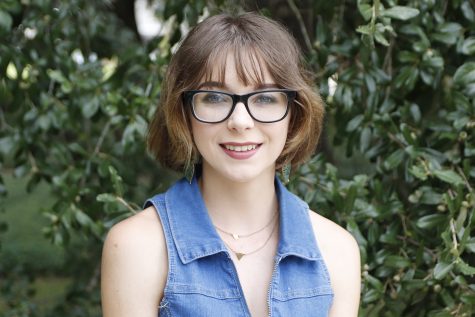
Instructor Valerie Young led one of the sections in the dyslexia seminar for education majors. Students had to read aloud a jumbled story while Young was instructed to yell at them if they made a mistake.
Annie Goodman/The Lion’s Roar
As part of the education curriculum, some students are required to attend a simulation to understand what it is like for children with dyslexia.
“Dyslexia is a language processing ability that is due to a brain difference,” said Dr. Elizabeth Wadlington, a professor of education. “What we do in here is we try to let the students experience the feelings that a person with dyslexia feels all the time. They are going to be future teachers. We try to make sure every Teacher Ed. candidate in our program goes through the dyslexia simulation at least once before they graduate. That way they are prepared to go into the schools and teach the children with dyslexia.”
This event, hosted on Tuesday, Mar. 14, has been going on for a number of years and aims to help future students learn how to handle these cases in the future.
“Most of the children who have learning disabilities have problems in reading and very often the reading problem is dyslexia,” said Wadlington. “Not always but very often. So, if we can teach teachers how to help these children, how to do interventions for them, then we’ve helped a large percentage of the population in our schools.”
Wadlington feels dyslexic students are usually smart but need an alternate method of teaching to learn.
“There’s no cure for dyslexia,” said Wadlington. “There’s only intervention, so the teacher needs to know the proper strategies to use, how to do a lot of multisensory instructions and so forth in order to help the kids learn their best. These kids are usually very, very intelligent. They just need to be taught in different ways.”
For some students in attendance, this seminar was relatable and helped them to connect with people they know.
“It was definitely very moving,” said Britt Alexander, a sophomore early education major. “My dad had dyslexia, so it helped me to understand what he goes through every day.”
This event was hosted by Wadlington and facilitated by university professors Valerie Young, Michele Mayberry, Dr. Ellen Ratcliff, Dr. Stacy Garcia, Sandra Bailey, Gerlinde Beckers, Mary Ellen Scherer, Rosie Atwell, Meghan Case, Dr. Deborah McCarthey and Dr. Celina Echols. These professors were instructed to fuss at students who were struggling with activities.
“I would say it’s important because it showed us that sometimes teachers can get a little bit impatient,” said Taylor Eskine, a sophomore early childhood education major. “They don’t really realize how much trouble a student is actually having, and they end up rushing. It takes children with dyslexia a little bit longer to actually finish work, or they have to think about it. So, you just have to be patient with them.”
This event is held in hopes that students will learn to understand individuals with this disorder and to be able to educate them if needed.
“I hope students take away from this empathy for children and adults with dyslexia, and I would hope that they are better prepared to teach these students and to help them reach their full potential,” said Wadlington.


